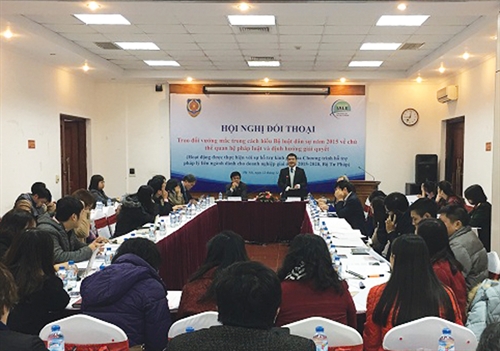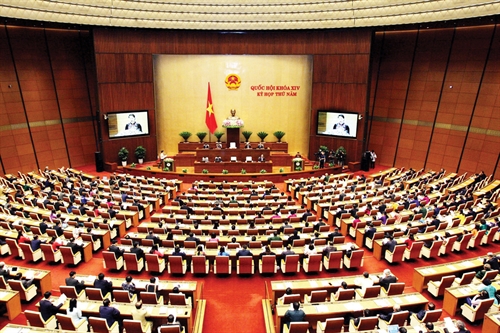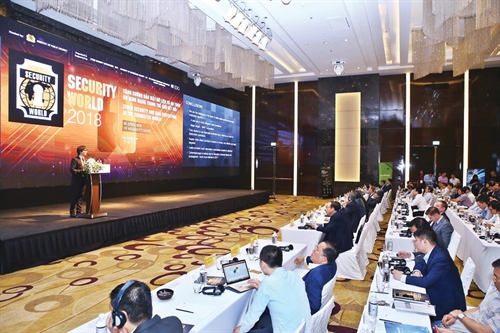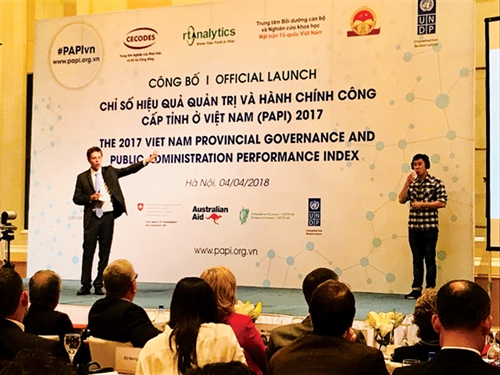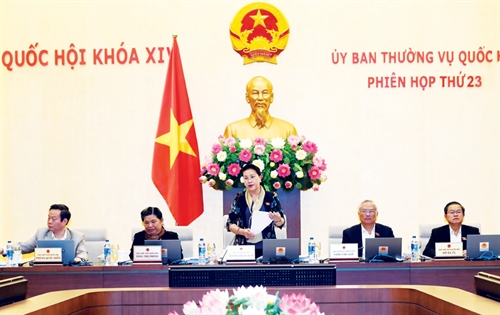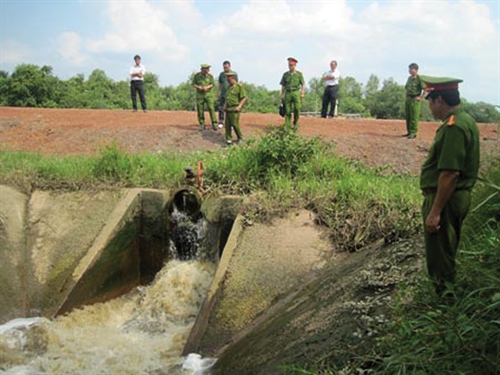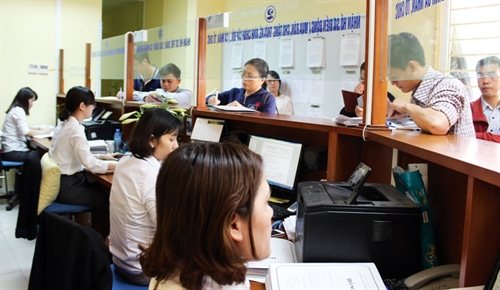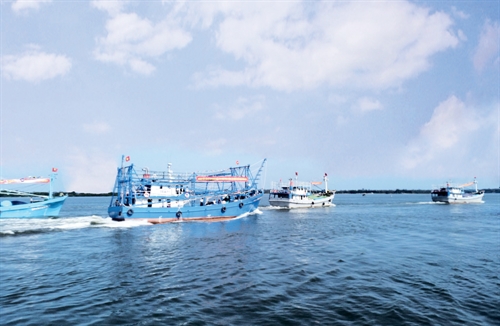The seventh plenum of the 12th Central Committee of the Communist Party of Vietnam (CPV) wrapped up in Hanoi on May 12, completing all the agenda contents after six working days.
During the session, members of the committee gave opinions on three draft plans on: building a contingent of officials at all levels, especially strategic level, with sufficient virtue, capacity and prestige on par with their assigned tasks; salary reform for officials, civil servants, the armed forces and laborers working in enterprises; and social insurance policy reform.
They voted to adopt a resolution of the session, and three resolutions on the three plans.
Addressing the closing ceremony, CPV General Secretary Nguyen Phu Trong highlighted the need of developing a contingent of officials, especially strategic officials meeting the requirements of the new period.
| According to Pham Quang Hung, head of the Department of Central Agencies of the CPV Central Committee’s Organization Commission, strategic officials include around 600 officials in the CPVCC, Political Bureau and Secretariat, ministers and deputy ministers, heads and deputy heads of the sectors, secretaries and deputy secretaries of provincial-level Party Committees and, chairpersons of provincial-level People’s Committees and People’s Councils. |
He asked for resolute and persistent leadership and direction over the implementation of eight key groups of solutions and tasks set forth at the session, focusing on ideological, moral and lifestyle education among Party members as well as younger generations in association with the studying and following of late President Ho Chi Minh’s example.
It was necessary to renovate and improve the quality of personnel work, while paying more attention to developing strategic personnel, and promoting the role of the community in the work, he said.
The Party leader said that a highlight of the resolution is the requirement to seek a new performance assessment method for officials, which is more objective and accurate, along with an effective mechanism to encourage them to overcome difficulties to improve themselves, and measures to control power, prevent bribery for job titles, and fight against individualism and sectionalism in personnel work.
He underscored the principle that all powers must be strictly controlled through mechanisms, and authority must go with responsibility.
Meanwhile, it is vital to timely discover and handle violations of Party regulations and the State’s law, tackling the abuse of power to conduct wrongful activities in personnel work or abetting bribery for job titles. Alongside, inaccurate decisions on personnel work must be strictly withdrawn, while organizations and individuals committing violations in the field must be severely handled, he said.
“We should strive to gradually institutionalize the resolution into Party regulations and the State’s law on personnel work in the remainder of the CPV Central Committee’s 12th tenure,” the Party leader said.
“We would step by step arrange non-locals as secretaries of provincial- and district-level Party secretaries,” he disclosed.
“At the same time, it is a need to prepare personnel for the 13th Party Congress at all levels, focusing on the building of personnel for the Central Committee in the direction of improving the quality and ensuring an appropriate quantity and structure,” he said, noting the proactive preparation of leading personnel of the Party, the State, the Political Bureau and the Secretariat, who should stand out in intellectual, virtues and lifestyle.
During the session, the Party Central Committee came up with viewpoints, goals, tasks, policies and measures to continue speeding up salary reform with many contents having breakthrough significance and high feasibility.
For the public sector, it instructed the building of a new payroll system with one payroll based on position for those in the leadership in the political system, another based on profession for those not in the leadership, and three others for the armed forces. Allowances must be adjusted toward total allowances accounting for a maximum 30 percent of total pay funds. The head of a unit will be allowed to use the allocated pay fund and regular expenditure to hire experts and scientists with special talents and to use the bonus fund to award the unit’s employees periodically based on their work performance.
For the enterprise sector, the Party Central Committee pointed to the need to continue completing the policy on regional minimal monthly wages to protect underprivileged workers. Regulations on regional minimal hourly wages will be added.
Enterprises, those wholly owned by the State, will be empowered to decide on their salary policies. For state-owned enterprises, the State will regulate salary and the salary of its capital representative will not be included in the salary of the executive board.
The salary agreement mechanism in enterprises will be improved through creating a mechanism on dialogue, negotiation and agreement among entities in industrial relations.
Particularly, the Party Central Committee urged the building and improvement of the system of job positions to serve as a foundation for developing the payroll for job positions, job titles and leading positions.
It also stressed the need to ratchet up the reform of social insurance policy to turn social insurance into a key pillar of the social security system, considering it an urgent as well as long-term task.
A system of flexible, diverse, multi-layer and modern social insurance policies in conformity with international practices will be developed on the principle of “contribution-enjoyment”, ”equity”, “sharing” and “sustainability”, according to the resolution on social insurance policy reform.
| Vietnam’s social insurance system will be developed with a “multi-layer” pension program, according to Deputy Minister of Labor Doan Mau Diep. The first layer is social pension provided by the State for the elderly who have no pension, which may be either monthly social insurance benefits or allowance. The second layer is basic social insurance, compulsory and voluntary. The third layer is complementary pension insurance. |
To ensure the health of the social insurance fund in the long run, the Party Central Committee underscored the need to quickly supplement, revise and fix irrationalities in the current pension insurance mechanism. The retirement age will be raised under a proper roadmap regarding its suitability to specific groups and occupations.
| Based on the resolution, the Ministry of Labor, War Invalids and Social Affairs will propose necessary amendments to the 2012 Labor Code, including the proposal on the retirement age-raising roadmap, to the Government and National Assembly for adoption. Under this proposed roadmap, the retirement age would be raised from 2021, three or four months each year, until it reaches 62 years for men and 60 years for women working under normal conditions. |
Gender equality must be ensured. Measures should be taken to deal with the aging population and fast changes of the labor market and the introduction of new labor forms under the fourth Industrial Revolution.
At the sitting, the Party Central Committee agreed, through voting, to let Tran Quoc Vuong, Politburo member, permanent member of the Secretariat and Chairman of the Party Central Committee’s Inspection Commission, to leave the posts of member and chairman of the Inspection Commission.
The Party Central Committee elected Tran Cam Tu, Standing Vice Chairman of the Inspection Commission, as Chairman of the Commission.
The Party Central Committee also elected two additional members of the Secretariat, including Tran Thanh Man, President of the Vietnam Father-land Front Central Committee; and Tran Cam Tu, Chairman of the Inspection Com-mission. It considered and agreed to expel Dinh La Thang, deputy head of the Party Central Committee’s Economics Commission, from the Party.- (VLLF)
